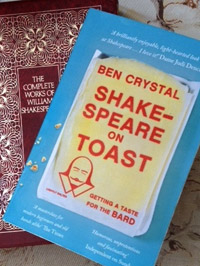 Shakespeare introduced 1,700 words and many phrases we still use today. He coined assassination, for instance, from the 8th century Arabic assassin.
Shakespeare introduced 1,700 words and many phrases we still use today. He coined assassination, for instance, from the 8th century Arabic assassin.
Even-handed, far-off, hot-blooded, schooldays, well-respected, are Shakespeare’s too, as are useful, moonbeams, subcontinent. [Without him we wouldn’t have the phrases] laughing yourself into stitches, setting your teeth on edge, not sleeping a wink, being cruel to be kind, and playing fast and loose.
In my English Honours degree we studied all the plays and many sonnets but that was a long time ago and it’s great to read a neat summary of some of Shakespeare’s achievements. Ben Crystal reminds us of the above list of words and phrases in his Shakespeare on Toast: Getting a taste for the bard (Icon, 2016). It’s an engaging, funny, accessible little book for a reminder of or an introduction to Shakespeare’s genius with language.
When I was little we had the book Tales from Shakespeare by Charles and Mary Lamb. It was a favourite and in King Lear I remember the picture of Cordelia, appearing to be asleep, wearing what I thought was a beautiful pale green nightie, her blonde plait hanging down her back. The caption said: ‘And Cordelia ended her life in prison.’
At five or six I couldn’t make any sense of the plot from Romeo and Juliet and I asked my older sister, why couldn’t they just agree not to see each other if it was going to cause so much trouble? No matter how she tried to explain romantic love she couldn’t make me understand such irrational behaviour.
My parents were strict but they were enlightened about education and we were allowed to read any book in the house. They reasoned that if a book was too old for us we’d be bored and stop reading it. When I was about eight, I read a novel called Be Ready with Bells and Drums by Elizabeth Kata, later to be made into a film called A Patch of Blue starring Sidney Poitier. And I came across a word I didn’t know the meaning of, and asked:
‘Mummy, what’s a prostitute?’
My mother looked up from her sewing and said, ‘It’s a woman who sleeps in her makeup.’
So quick. And clever too – she gave me the right impression: I knew that it was very bad not to wash your face before bed.
So one can invent appropriate definitions of words to suit certain circumstances, but it’s less unusual to invent new words themselves. Today new words are invented often, to keep up with contemporary unrelenting innovation. (Yes, some are awful [see Don Watson’s excellent books about this] but the degradation of English is not my topic today.)
A favourite neologism is muffin-top, coined when hipster trousers and skirts took over from having the waist at females’ waists, and a roll of fat between the anatomic waist and hip, forced to spill over by this unflattering fashion, is visible above the trousers or skirt. It’s a great fashion for the slender. The roll of fat in those of us not blessed with the figure of a teenage boy resembles that overflow of crusty muffin spilling over the top of the patty-pan (there’s an old word, the paper holder of a patty cake, now replaced by the American cup cake or in this case, I guess, cup cake paper. (What is the American word for patty-pan?)
My absolute favourite, much more recent, new word is jobstopper, referring to a tattoo in a place where it can’t be hidden by clothes when going to a job interview, which will give a bad impression to the interview panel.
Nobel Prize winning writer Doris Lessing once referred to ‘the thinning of language against the density of our experience’. I don’t think this is happening. I think that our language is almost infinitely rich and that English-speakers will continue to enrich it with coinages like the above that are witty and concise. What are your favourite new words?
[contact-form][contact-field label=’Name’ type=’name’ required=’1’/][contact-field label=’Email’ type=’email’ required=’1’/][contact-field label=’Website’ type=’url’/][contact-field label=’Comment’ type=’textarea’ required=’1’/][/contact-form]

Leave a Reply